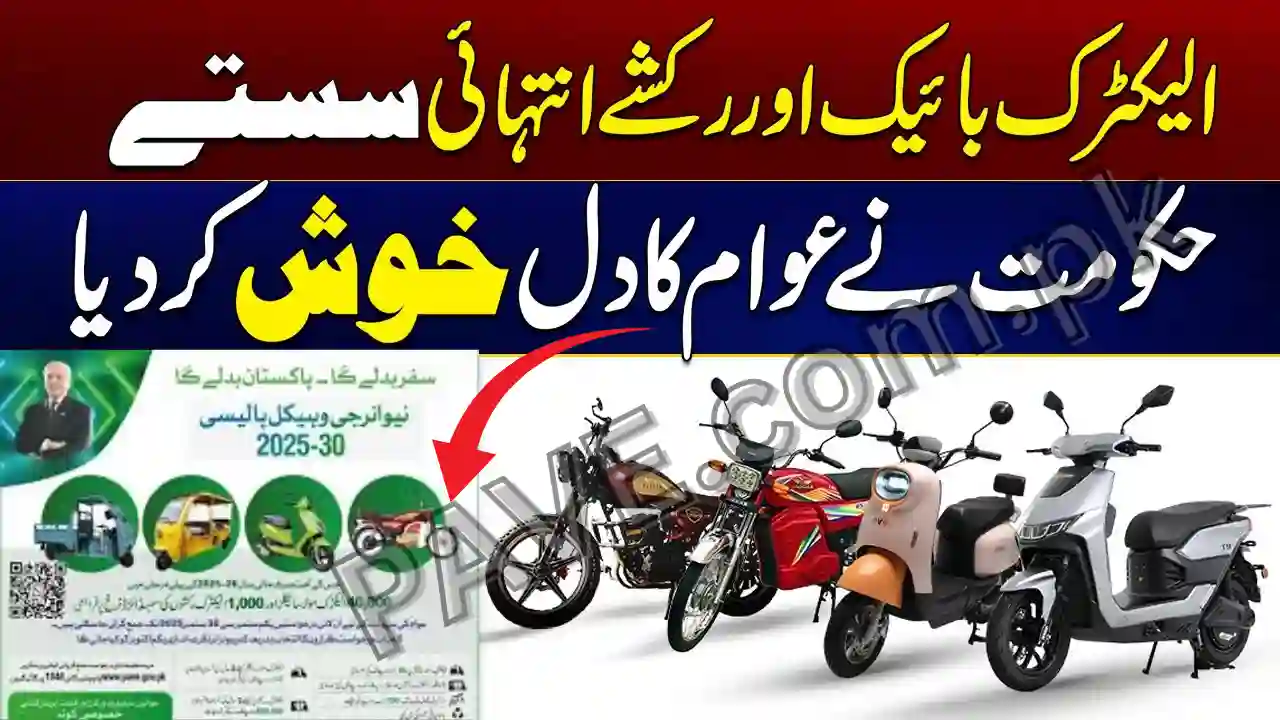Government of Pakistan Provides 41,000 Subsidized EV Bikes and Rickshaws

The government of Pakistan has announced that 41,000 citizens will soon receive subsidized electric bikes and rickshaws. This initiative is part of a broader effort to promote clean energy transportation, reduce air pollution, and support citizens with affordable mobility options. The program targets low- and middle-income families, helping them save money on fuel and access modern, eco-friendly vehicles. With electric vehicles (EVs) gaining attention globally, this move highlights Pakistan’s commitment to a greener, more sustainable future.
Overview of the Program
The subsidy program is being implemented under the Pakistan Accelerated Vehicle Electrification (PAVE) initiative. PAVE is designed to encourage citizens to adopt electric vehicles by reducing the initial cost through government support. The 41,000 electric bikes and rickshaws will be distributed across urban and semi-urban areas where EV infrastructure, such as charging stations, is accessible.
Officials stated that the program aims to achieve multiple goals:
- Reduce fuel consumption by promoting electric mobility.
- Lower environmental pollution, particularly in major cities.
- Empower citizens by providing affordable, modern transportation options.
- Encourage local investment in EV assembly and infrastructure.
Read Also: PAVE Balloting Results 2025: Check Your Electric Vehicle Subsidy Status Today
Eligibility Criteria For PAVE Scheme Phase 2
The government has set specific eligibility requirements to ensure the subsidy reaches the right citizens:
- Applicants must be Pakistani nationals.
- Individuals must be above a certain age to legally operate a vehicle.
- Preference may be given to low- and middle-income families.
- Applicants should not already own a subsidized EV under previous programs.
- Residency in urban or semi-urban areas where EV infrastructure is available.
The application process will be transparent and merit-based, ensuring that all eligible citizens have an equal opportunity to benefit from the subsidy. Applicants will register online, submit necessary documents, and complete verification procedures.
Benefits of Subsidized Phase 2 Electric Vehicles
The subsidized electric bikes and rickshaws offer several advantages for citizens:
- Lower Transportation Costs: EVs are cheaper to operate than petrol or diesel vehicles, saving thousands of rupees annually.
- Environmental Impact: Electric vehicles produce no exhaust emissions, helping reduce urban air pollution.
- Job Opportunities: Commercial electric rickshaws provide income for drivers and small business owners.
- Modern Technology: Citizens gain access to efficient, low-maintenance, and technologically advanced vehicles.
- Health Benefits: Reduced emissions contribute to better air quality, benefiting public health.
Economic and Social Impact
The program is expected to create positive economic and social outcomes:
- Empowering Citizens: Access to affordable electric vehicles improves mobility, allowing people to commute for work, education, and business efficiently.
- Boosting Green Economy: The subsidy encourages local assembly, maintenance, and sales of electric vehicles, stimulating investment in the EV sector.
- Reducing Fuel Imports: Increased adoption of EVs will gradually decrease Pakistan’s reliance on imported petrol and diesel.
- Encouraging Innovation: The program motivates local businesses and entrepreneurs to develop EV-related technologies, services, and infrastructure.
Experts predict that initiatives like this will accelerate EV adoption, promote sustainable transportation, and support Pakistan’s long-term environmental and economic goals.
Read Also: PAVE Nadra & Bank Verification Pending? Here’s the
Government Support and Infrastructure
The Pakistani government has taken several steps to ensure the success of EV adoption:
- Charging Stations: Plans are underway to expand public and private charging infrastructure in urban areas.
- Training Programs: Citizens receiving subsidized EVs will be guided on proper usage, maintenance, and safety.
- Tax Incentives: Reduced import duties and exemptions on registration and sales taxes make EVs more affordable.
- Monitoring and Transparency: The government will ensure that the distribution process is fair and free of corruption.
These measures create an enabling environment for EV adoption while promoting sustainable practices in transportation.
Urban and Rural Impact
While urban areas are expected to benefit the most due to high population density and better charging infrastructure, semi-urban and rural areas will also gain from commercial electric rickshaws. In cities like Karachi, Lahore, and Islamabad, citizens will save on fuel costs and enjoy smoother commuting experiences. Rural areas will see increased opportunities for local businesses and transport services through electric rickshaws.
The program is designed to balance accessibility between urban and rural populations, ensuring equitable distribution and maximizing the social impact.
Read Also: PAVE Nadra & Bank Verification Pending? Here’s the Complete Process
Challenges and Considerations
While the program is promising, some challenges must be addressed:
- Charging Infrastructure: Adequate and reliable charging stations are critical for EV adoption.
- Consumer Awareness: Citizens must understand battery life, maintenance, and EV benefits.
- Initial Costs: Even with subsidies, EVs are relatively more expensive upfront than traditional vehicles.
- After-Sales Support: Reliable maintenance and spare parts availability are essential to ensure user satisfaction.
The government and private sector are working together to tackle these challenges by expanding infrastructure, offering training, and setting up support networks.
Long-Term Outlook
The distribution of 41,000 subsidized electric bikes and rickshaws is expected to pave the way for broader EV adoption in Pakistan. In the long term:
- EV sales are likely to increase, creating a competitive market and driving innovation.
- Environmental benefits will grow as more citizens switch to clean energy vehicles.
- Economic growth will be stimulated through local assembly, service networks, and job creation.
- Sustainable urban transport will improve, reducing traffic-related pollution and congestion.
Analysts believe that programs like this could transform Pakistan’s transportation sector, making EVs a mainstream choice for urban and commercial mobility.
Government of Pakistan Provides 41,000 Subsidized EV Bikes and Rickshaws Conclusion:
The government’s initiative to provide 41,000 subsidized electric bikes and rickshaws is a major milestone in Pakistan’s journey toward sustainable transportation. The program not only reduces transportation costs for citizens but also promotes environmental responsibility, economic growth, and technological advancement.
By making electric vehicles accessible, Pakistan is taking a significant step toward a cleaner, greener, and more energy-efficient future. Citizens, especially low- and middle-income families, will benefit from affordable, modern, and eco-friendly transportation, while the country moves closer to achieving its environmental and economic objectives.
This program highlights the government’s commitment to supporting citizens, reducing pollution, and building a sustainable transportation infrastructure for the years to come.
Important FAQs About 41,000 Citizens Will Get Subsidized Electric Bikes & Rickshaws
Who is eligible to receive the subsidized electric bikes and rickshaws?
Eligible citizens include Pakistani nationals, primarily low- and middle-income families, who meet the criteria set by the government under the PAVE program.
How can citizens apply for the subsidized EV bikes and rickshaws?
Applications are usually submitted through the official government portal, where citizens provide personal details and required documents for verification.
What are the benefits of using subsidized electric bikes and rickshaws?
These vehicles reduce fuel costs, are eco-friendly, help lower air pollution, and provide affordable, modern transportation options for commuting or commercial use.
When will the distribution of the 41,000 EV bikes and rickshaws begin?
The government has announced the program, and selected applicants will be notified through official channels once the distribution schedule is finalized.







